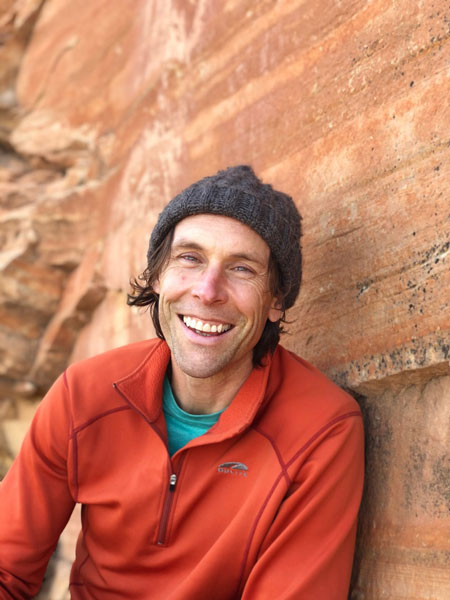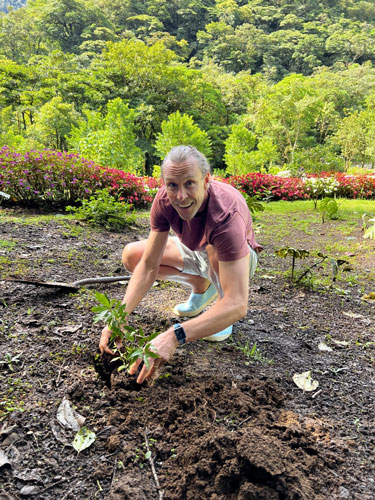Faculty Feature: Chris Ingraham

Chris Ingraham is an Associate Professor in the Department of Communication and on the core faculty of the Environmental Humanities Graduate Program at the University of Utah. His work as an active teacher and researcher is in the areas of media aesthetics, environmental communication, and rhetorical theory. Generally, he tries to draw on the insights of these fields to think about the material, aesthetic, and affective practices that configure the environments we create and inhabit. Before becoming an academic, Chris worked for several years as a freelance writer. Though the arts remain central to his interests, his academic training across the humanities commits him to cross-disciplinary thinking with the belief that we should bring all available knowledge to the problems we're trying to understand.
Below are Chris's responses to questions about his recent Environmental Humanities seminar, his research, and advice for current students.
You just wrapped up teaching the Fall 22 Environmental Humanities Issues Seminar. The course title was Affect Theory and Ecological Crisis. What is affect theory and what lens does it give us to understand or examine ecological crisis?
For millions of people, on a daily basis, ecological crisis impinges materially on their ways of being in the world. It affects their livelihoods, their health, their ordinary routines, their futurity. For those impacted in this way, loss and grief, and the precarity of unwanted change, are what it means to be alive these days. But for others in more fortunate parts of the world (often those parts most responsible for perpetuating climate crises), it’s also possible to feel the weight of so much loss: habitats destroyed, rampant extinctions, desertification, sea level rise, plastics (almost literally) everywhere. As I see it, affect theory is a study of the shimmers, glisks, and intensities of nascent feeling that are somewhere on the periphery of consciousness or articulation, but also somewhere between personal and shared. That makes it more a project of thinking-feeling affectability than of studying any nameable “affects” as such. And if it’s about the ability to be affected, then it becomes a way of engaging with the ways “we” can all be in this together at the same time that people are differentially impacted or responsible. No single person created our ecological problems, but we are all implicated. Affect theory in this sense is a study of the liminality of being collective and individual at once. “More than me, less than we.”
What drew you to the environmental humanities?
I can’t remember a time when I wasn’t drawn to the outdoors and the wonders of the earth, and it was pretty early on, too, when I realized that the arts, music, literature and such were one of the main ways I came to understand and engage with being alive. When I got older and realized that these things were part of what’s called “the humanities,” I knew right away the humanities were for me. But it seemed like all the amazing things humans have done—and all the ways we make sense of our place on earth or in the cosmos—also needed to be balanced against the hideous acts of exclusion and exceptionalism that have ended up subordinating others, humans included, but especially the earth, its ecosystems, and all the other-than-human forms of life it fosters. How, then, to study the humanities without tacitly condoning an anthropocentric view of the human and reinforcing all those presumed entitlements? When I eventually learned there was something called the “Environmental Humanities,” it came as a total revelation. Here was a pluralistic, multi-disciplinary area of inquiry that saw as its calling (or as one of its callings), the project of addressing how all the wonderful and detrimental impacts of humans on earth are entangled. To me, work in the Environmental Humanities seems to acknowledge the vast and incredible inheritance of human kind, while also tuning its senses to the ways the human experience—our history, philosophy, art, literature, music, communication, and so forth—can help address the detrimental human impact on the planet. I’ve never felt more at home.

In your most recent book, Gestures of Concern, you show how gestures such as a “Get Well” card may have minimal instrumental effect, yet they still affect social relations in significant ways. In a recent journal article “New Normals, from talk to gesture” you extend this discussion to COVID-19. How have concerned gestures shaped our experience of COVID-19? What can we learn from gestures of concern that we may miss in more traditional discourse analysis?
There were these wonderful moments during the quarantine phase of the pandemic when people so desperately realized they needed social connection, but the ordinary means available to achieve it weren’t as possible. So, they did these gestural things to maintain, and to build, a measure of community and solidarity. There are numerous examples of this, from New Yorkers applauding out their apartment windows at 7:00 p.m. each day to celebrate the essential workers, or people in all 50 states and in nearly a hundred countries going outside at 8:00 p.m. to howl wildly into the sky. These sorts of gestures don’t attain their force through rational argument or debate—the typical communicative lynchpins of liberal democracies. I think they’re rather best understood as expressions into form of an affective relation. Winning an argument or even making meaning isn’t necessarily their point. In my neighborhood here in Salt Lake, sidewalk chalk became a big thing, as did painting river rocks in front-yards, or putting teddy bears in windows so pedestrians could have a kind of scavenger hunt if they were out on a walk. We began hearing all over about mutual aid networks getting busy. Kinship networks. Chosen families or pods. I think what matters here is that people began acting from a place that didn’t just assume their ready-made “community” existed anymore, at least not in the same way or to the same degree, which means they had to create it themselves. What they create is a kind of affective commonwealth, even from a distance. And this isn’t just a pandemic thing either. Once you start looking, you realize that gestures of concern are a huge part of how social life and democracy holds together in the first place.
Beyond Gestures of Concern, your research more broadly is in the areas of media aesthetics, environmental communication, and rhetorical theory. What projects are you currently working on?
When you organize a career around curiosity and inquiry, it’s easy to get drawn in multiple directions. As a result, I’m always working on multiple projects. Polyculture not monoculture, rotate crops, etc. The benefit of that approach is that no single project ever gets too stale, and each ends up enriching the others. One of the things I’m finishing is a short, lyrical book about darkness during the polar night in Longyearbyen, Svalbard, the northernmost permanent settlement on earth. I had the chance to spend some time there a few years ago, and it really left an impression. The premise is that I went “looking for global warming” up there, because Longyearbyen’s location and relatively substantial infrastructure makes it one of the places on earth where an outsized portion of all climate data is collected. But I’m well aware that global warming isn’t something that can be found like some geocache with GPS coordinates, so darkness operates in the book as a metaphor of sorts, too. One of the major ideas is that darkness is a kind of media – the way TikTok is a medium or music is a medium – and that all mediums influence some ways of being and foreclose others. Well, so how does darkness-as-medium affect ways of being/thinking/feeling/doing on the planet so far north? Anyway, that’s one project. Another is a larger project on plant communication. I’m really excited about that one, but there’s too much to say here!
Before working in academia, you were a freelance writer. Environmental Humanities students often pursue various paths—PhD programs, writing careers, nonprofit work. What advice do you have for students as they map their future? What’s the value in exploring various pursuits throughout a career?
Exploring a variety of pursuits is a good way to learn which ones are best for you. But that happens because in the process you’re also learning what’s not for you, as well as encountering different kinds of people with different approaches to their work and free time, not to mention different fields and industries or things they think matter—or that can at least pay the bills. My take is that the broader the range of personal and professional experiences you have to draw upon, the more invested you’ll be when you pursue one that’s informed by having shopped around some, and by then you’ll have a broader set of adaptable skills and communicative faculties to thrive. As for advice, hmm. Maybe…Don’t worry too much about the future that you forget being who you want to be today. Get enough sleep. Eat plant-based. Exercise regularly, preferably outdoors. Be a lumper, not a splitter (look for connections, not disconnections). Have fun. Be gentle. Do something you love. Take everything seriously, but not too seriously.
Categories
Featured Posts
Tag Cloud
- community engagement (12)
- outdoor recreation (2)
- outreach (1)
- alumni (3)
- admissions (1)
- faculty (8)
- practitioner-in-residence (2)
- cultural anthropology (1)
- utah award in the environmental humanities (1)
- environmental justice (2)
- STEMCAP (2)
- STEM (2)
- water (1)
- communications (2)
- humanities (1)
- Taft-Nicholson Center (1)
- director (3)
- student (5)
- API (1)
- Asian American (1)
- Pacific Islander (1)
- graduation (1)
- research (3)
- thesis (1)
- project (1)
- Indigenous (1)
- Shoshone (1)
- Great Salt Lake (2)
- Bear River (1)
- land acknowledgement (1)
- STEMAP (1)
- public engagement (1)
- science (1)
- science communication (1)
- Wilkes Center (1)
- climate change (1)
- climate science (1)
- climate policy (1)
- policymaking (1)
- funding (1)
- storytelling (1)
- radio (1)
- journalism (1)
- racial justice (1)
- outdoor education (1)
- writing (1)
- non-fiction (1)
- energy extraction (1)
- reading (1)
- environmental education (1)
- affect theory (1)
- media (1)
- rhetoric (1)
